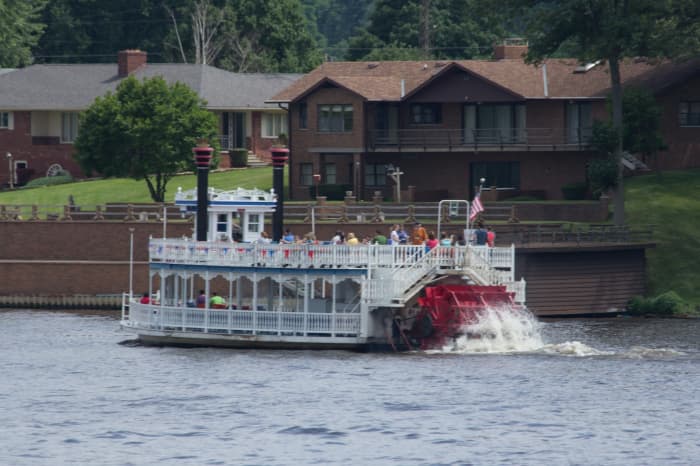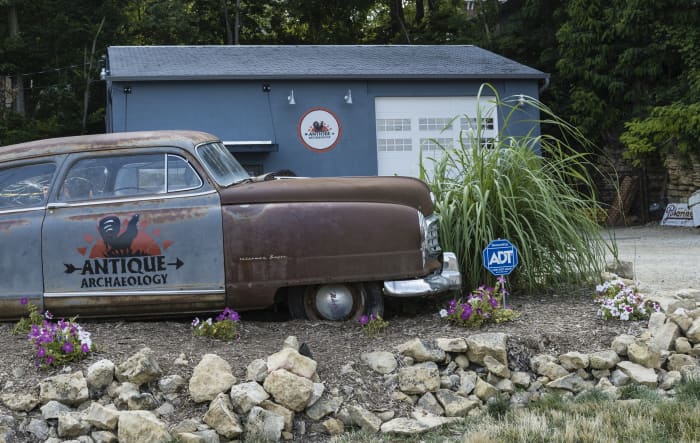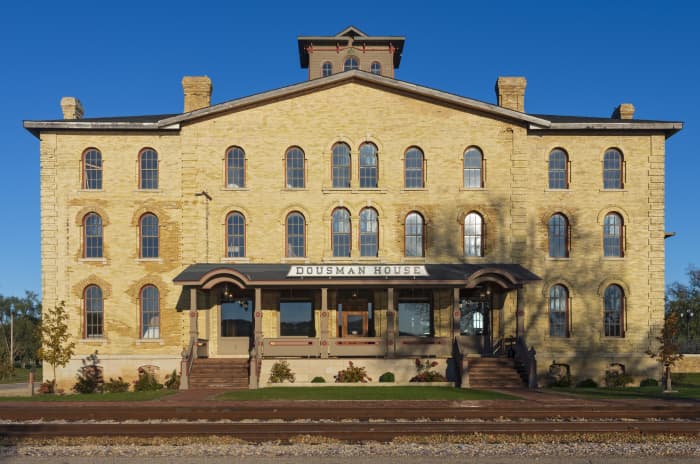Dear MarketWatch,
I’m looking for a small-town atmosphere, with open land around it and maybe a body of water nearby. I always said my ideal would be water in the front and trees in the back. I can’t be too far from the family just west of the Chicago suburbs, but I am done with Illinois! It doesn’t matter how many red counties you have, Chicago votes in who they want and we all have to go along with it.
I have moved around a lot in the past and I know I don’t want the extreme humidity of the south, having lived in Georgia and Virginia. I lived in the southwest desert and I loved no mosquitoes and low humidity, but it’s way too hot and not enough turn of seasons.
So after a lot of soul-searching, and the need to be near family, I’ve targeted Iowa, Indiana, and Wisconsin. I would define a small town as 15,000 people or less, and I would like it to have a downtown area with some places to go to for eats. Not looking for a super liberal area. My price range is $ 250,000 or less.
When I do the search on the “where should I retire” tool, I always click on moderate humidity in the summer, and 10 to 25 inches of snow in the winter — with winter temperatures around 30.
Thanks! I appreciate your feedback.
Cyndi
Dear Cyndi,
You can have all the red counties you want, but when most of the state’s population lives in and around Chicago and they vote … well, that’s how the system works.
But you want out. That’s fine, and I’m glad you’ve discovered our tool. I’m sure you already know a spot on the water doesn’t come cheap. And it’s hard to find somewhere in Wisconsin that doesn’t get well over 2 feet of snow each winter. Indiana is more doable, but the tradeoff is that you’ll need to battle Chicagoland interstate traffic whenever you go see family.
As you contemplate your options, please think hard about how you’re going to build your new life. It would be a shame if you find yourself driving to a larger place for doctors, friends, group activities, even groceries. So test out your shortlist and its openness to newcomers before you commit.
Finally, watch out for small towns (and counties) that are stagnant. Unfortunately, there are plenty. One day you’ll need to sell that house.
Read: There is more to picking a place to retire than low taxes — avoid these 5 expensive mistakes
Here are suggestions to get you started in each of the three states.
Indiana

Lake Shafer, by Monticello, Ind.
Courtesy Visit Indiana
The area around Lafayette came up first for me when I used the retirement tool to search all three states. (It matched 100% for more balanced politics — it went narrowly blue in the 2020 presidential election — as well as median home prices below $ 250,000, moderate humidity and snowfall of 10 inches to 25 inches.) But Lafayette, with about 73,000 people, is too big, and smaller West Lafayette, home of Purdue University, not only is still too big but will have little in your price range. But if this area appeals, look in the rest of Tippecanoe County.
The retirement tool also suggested the areas around Logansport (17,000 people) and Frankfort (16,000) that are more conservative but otherwise matched your criteria and are less than four hours by car from family.
But I’m going with Monticello, a town of 5,200 by Lakes Shafer and Freeman and about three hours to family. White County is solidly conservative, and Indiana Beach, an amusement park with, yes, a beach, is a draw for the wider area. But you can enjoy the lake without the roller coasters.
When you need more than you can find in Monticello, Greater Lafayette is 30 miles away. Brookston is about halfway to Greater Lafayette if you want a compromise, but it is far smaller and your water would be Moots Creek at the southern end of town.
An alternative could be Chesterton, which has 14,000 people and is at the eastern edge of “the Region,” as Indiana’s part of Chicagoland is called. It’s only two hours from family, in part because the drive is pretty much all interstate. Porter County went red in 2020. When you want to go to Chicago for fun, you’d have the option of picking up a South Shore train from the Dune Park station just a few miles away.
Chesterton is just south of Indiana Dunes National Park along Lake Michigan and west of other natural areas — but lake-effect snow means more white stuff than in Monticello (and more than your target). And it’s pricier, albeit right now in a buyer’s market.
Here’s what’s on the market now in Monticello, using listings on Realtor.com (which like MarketWatch is owned by News Corp); the median list price in October 2021 was $ 226,000. This is the market in Chesterton, where the median list price was $ 304,900.
Iowa

Antique Archaeology, whose original store is in LeClaire, Iowa, is home base for the TV show “American Pickers.” A second location is in Nashville, Tenn.
Getty Images
Davenport and Scott County, part of the Quad Cities area, come up on the “Where to Retire” tool. It’s just across the Mississippi from Illinois and gets an average of 26 inches of snow each year, so close to what you want. It’s also a touch warmer than Wisconsin. While Davenport is too big for you (just over 100,000 people), LeClaire, on a bend in the Mississippi, might be an option.
This town, less than 15 miles from Davenport, has been growing quickly but still has fewer than 5,000 residents. You may know LeClaire as the home of Antique Archaeology, the store behind the “American Pickers” television show. It’s also the birthplace of Buffalo Bill. Nearby are popular winter roosting sites for bald eagles.
One other thing it’s known for: a tug of war with Port Byron, Ill., across the river. The rope stretches from one side to the other, but, no, the losers don’t actually fall into the water.
The town will attract more day-trippers than you might expect, but that means you also get more restaurant choices.
If LeClaire doesn’t have the small-town feel you want, look at Eldridge, with close to 7,000 people and north of Davenport. The surrounding area is more farmland than woods, though. Underscoring the agricultural focus is the grain bin downtown.
Both small towns are close to Scott County Park, with 1,280 acres and lots of trees. Scott County went blue in 2020 by a relatively small margin.
Home prices may surprise you. Here’s what’s listed for sale right now in Le Claire, where the median list price was $ 319,900 in October, and in Eldridge, with a median list price of $ 305,000.
If neither is right, keep driving toward Iowa City, which is about 2½ hours by car from your family. The home of the University of Iowa ranks highly on lists of great places to live, and I’ve suggested it here. Given that it is too large based on your criteria, look for an appealing spot between it and Davenport.
Wisconsin

Once a hotel at the end of a railway line in Prairie du Chien, Wis., Dousman House is now an event space.
Getty Images
I’m struggling to find a place that falls under your desired snow ceiling.
The retirement tool suggests Winnebago County (the area around Oshkosh), three hours straight north, and you’ll find a marina but also 3 feet of snow. (Fond du Lac to the south is smaller and may be a better fit, but 43,000 people isn’t small.) There are plenty of lakes around that area, so that might be worth exploring.
I chose to follow the route south and came to Edgerton, a town slightly larger than Monticello and mostly in Rock County (which went blue in 2020). One attraction is Lake Koshkonong, a 10,595-acre lake no more than 7 feet deep. A big bonus is that Edgerton is only about 75 minutes from your family.
Warning: Average winter highs will be below freezing, and you can count on 3 feet of snow. You’re also about a half-hour’s drive from Madison, which could boost prices. Indeed, the median list price in October was $ 275,000, according to Realtor.
A more affordable option could be similarly sized Prairie du Chien, on bluffs above the Mississippi River and across the Wisconsin River from Wyalusing Hardwood Forest. But this more conservative area is 3½ hours away from family and gets similar weather.
Here’s what’s on the market now in both Edgerton and Prairie du Chien.
Readers, where should Cyndi retire? Leave your suggestions in the comments section below.
More from Marketwatch’s ‘Where Should I Retire’ column
I want to move to a walkable, historic, four-season town and have a budget of $ 30,000 a year — where should I retire?
We want to live in a small town where we can bike, hike and kayak — so where should we retire?
I want to get out of New York state and retire to a rural location with four seasons — where should I go?
We are conservative Christians looking for our utopia: a friendly, safe and affordable small town. Where should we retire?
We want to retire to a small mountain town on $ 18,000 a year — where should we go?
We want to retire in ‘an area like the Berkshires, but warmer’ — where should we go?
